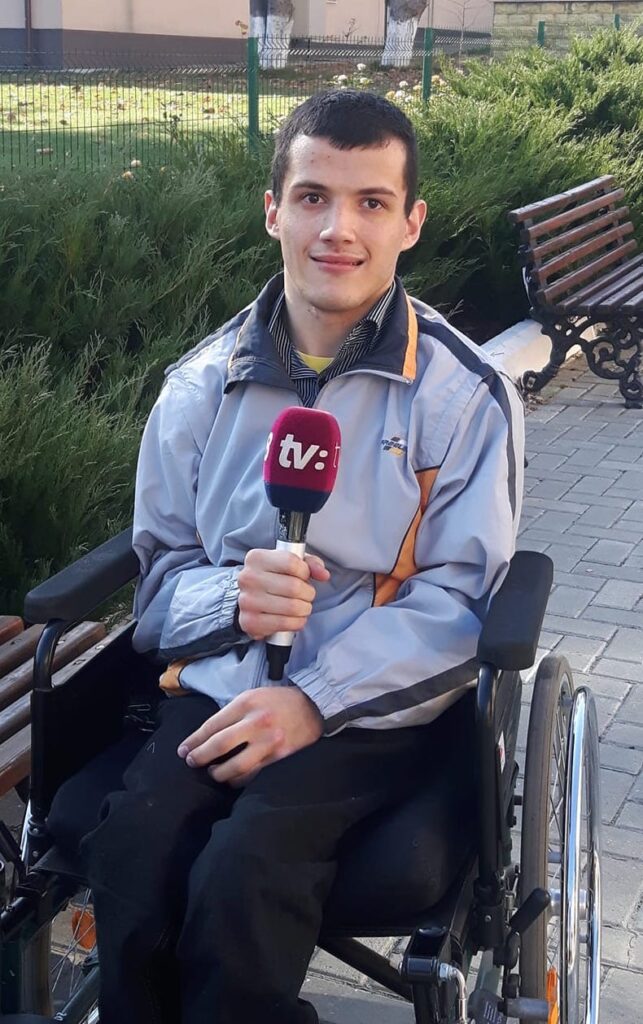By Mark Worth
Coalition Co-coordinator
As if being a whistleblower is not difficult enough. Exposing hidden crimes requires a special kind courage most people don’t have. On top of this, imagine you are a disabled orphan – abandoned by your parents, housed in an abusive orphanage your entire childhood, and confined to a wheelchair.
Marcel Lemnaru proved that anyone can be a whistleblower, and that anyone can prevail against powerful opponents. It is a gamble he took and won.
Lemnaru decided that 26 years of mistreatment and neglect in children’s homes was enough. Last September he told Chişinău television station PRO TV that he and other disabled children suffered continual mistreatment in institutional facilities in the Moldovan city of Orhei.
“They beat the children very often. We were tied to radiators or kept a whole day and night in the bathroom. They hit my head on the radiator,” says Lemnaru. “We were left without food if we did something bad or didn’t behave.”
Journalist Natalia Zaharescu detailed Lemnaru’s revelations and the events that followed in the newspaper Ziarul de Gardă (“The Guardian”) on July 29.
“They fed us very poorly. I mean, sausage rarely at all. Fish rarely at all. Meat rarely at all,” Lemnaru told Zaharescu. “The help that came – donations, sweets, clothes and personal hygiene things – didn’t reach the children or the employees who took care of us. That is, they went to the warehouse and were given [to us] only when the officials came.”
“It was very difficult, because there you stay within the four walls,” he said.

‘I never gave up. I’m always a strong fighter.’
Rather than being supported and thanked for exposing the abuses, Lemnaru was punished. Later in the day following the PRO TV broadcast, the orphanage’s deputy director filed a defamation complaint against Lemnaru, who the police promptly fined 1,200 lei (€60). He knew it was unfair, but Lemnaru paid the fine quickly so the problem would go away.
“Fining me wasn’t right. They also threatened me that if I didn’t pay this fine, I would leave my home and be transferred to another institution. I got really scared and even cried. For me it was a very big emotional stress,” he told Zaharescu.
“I was going forward because of these children. I never gave up. Even if I was stressed. I always went forward. I never took a step back. I feel sorry for these kids. I’ve been there since I was five. I’ve seen what happens. I have the courage of life to tell the stories of the children and my life story. I’m always a strong fighter. I have never lied and I will never lie about these cases.”
Moldova’s Ombudsman recognized how Lemnaru was being persecuted and came to his defense. “I see a lot of courage when a disabled person takes this position and makes such disclosures,” said Ada Șimon, the Ombudsman’s head of investigations. “He said he did not do for himself, but for his colleagues and for the boys who live in this facility.”
As the public institution in charge of protecting whistleblowers, the Ombudsman granted Lemnaru whistleblower status and helped him state his case in court. Also with the assistance of attorney Iulian Rusanovschi, Lemnaru challenged the fine and won his case before the Orhei Court in April 2023. A judge ruled in his favor and cancelled the fine, agreeing with the Ombudsman that Lemnaru should be protected under Moldova’s whistleblower law.
‘Everything would have been covered up’
Marcel told Zaharescu he believes conditions in the orphanage have improved – but this wouldn’t have happened without him. “If I hadn’t come out publicly, I think the authorities wouldn’t have taken up the case and wouldn’t have investigated. I mean, everything would have been covered up and they would have said that everything is fine, everything is perfect, everything is OK and that’s the way things remain. But I decided not to leave it like that, because there are children abandoned by their parents.”
In an unfortunate coda to the case, the orphanage’s director invoked stereotypes to dismiss Lemnaru’s claims. “I would like to mention that he is still a boy with disabilities and sometimes he still exaggerates things,” she is quoted by Zaharescu.
Șimon stands Lemnaru: “As far as I know, there is a criminal investigation initiated now in which Marcel Lemnaru has a witness status. The authorities will answer these questions and these doubts will disappear as a result of the investigation of this criminal case.”
Lemnaru is one of nine people who have received legal protection since Moldova’s whistleblower law took effect in 2018. Along with the Ombudsman, the law is also enforced by the National Anti-Corruption Center. “Many people look at this topic with shame. They perceive integrity whistleblowers as ‘snitches,’ ” said the Center’s Ion Pruteanu. “Trust is the key factor. If there isn’t this trust, they won’t speak. As long as there is trust, people will talk.”
In order to build this trust further, Moldova has improved and strengthened its whistleblower law. A new law, which allows more types of misconduct to be reported and more categories of people to be protected, was passed in July. It is expected to take effect in September.



